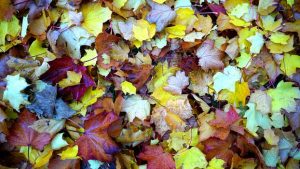 Less daylight hours, breezy winds, leaves falling, and rainfall. All these are indicators that fall will soon be upon us. These are some of the outward manifestations of autumn. Our bodies feel the change of season as well. You may experience dry skin, sinus congestion, diminished appetite, constipation, gas, less vitality, and dampened enthusiasm. Following these Ayurvedic tips for fall health will put you on the right track for a balanced autumn.
Less daylight hours, breezy winds, leaves falling, and rainfall. All these are indicators that fall will soon be upon us. These are some of the outward manifestations of autumn. Our bodies feel the change of season as well. You may experience dry skin, sinus congestion, diminished appetite, constipation, gas, less vitality, and dampened enthusiasm. Following these Ayurvedic tips for fall health will put you on the right track for a balanced autumn.
Seasonal junctures are the times when the doshas (Vata, Pitta, and Kapha) can easily become imbalanced. The external change has an effect on our homeostasis as we respond to our environment.
VATA DOSHA
 In Ayurveda, Vata is the dosha which is most likely to become imbalanced during the fall. A way to determine how Vata falls out of balance is to examine which of its qualities get vitiated. A primary quality of Vata dosha is dry. This is found in both food and lifestyle. One of the Ayurvedic tips for fall health is to avoid eating dry foods such as dry fruits, dehydrated foods, freeze dried fruits, nuts, and crackers. This quality manifests as extremely dry skin, dehydration, and fatigue. Excessive dryness also shows up as a dry cough, sore throat, and constipation.
In Ayurveda, Vata is the dosha which is most likely to become imbalanced during the fall. A way to determine how Vata falls out of balance is to examine which of its qualities get vitiated. A primary quality of Vata dosha is dry. This is found in both food and lifestyle. One of the Ayurvedic tips for fall health is to avoid eating dry foods such as dry fruits, dehydrated foods, freeze dried fruits, nuts, and crackers. This quality manifests as extremely dry skin, dehydration, and fatigue. Excessive dryness also shows up as a dry cough, sore throat, and constipation.
In the fall, we should balance the cold quality of Vata. In the warm summer weather, your preference may have gone to eating cold foods ranging from salads to ice cream. Eating old, cold, or frozen food will create stagnant veins and constrict the movement of the plasma within in the body. This temperature imbalance manifests as varicose veins, poor circulation creating cold extremities, indigestion, congestion, and cough.
As the hours of sunlight dissipate, we may tend to be less active. Thus, it is harder for the gastric fire or the agni to remain kindled when it is inactive. It is important to drink warming drinks which assist digestion such as cumin, coriander, and fennel tea or even ginger tea.
 AYURVEDIC TIPS FOR FALL HEALTH:
AYURVEDIC TIPS FOR FALL HEALTH:
- Do a seasonal cleanse. This involves eating khichadi -which is considered to be a cleansing food for all doshas.. You can get a pre-made mix or just mix mung dahl and white basmati rice with 1/2 tsp mineral salt and 1/2 tsp turmeric powder. You can also add some ghee or flax seed oil to it.
- To lubricate your sinuses, add a few drops of nasya oil both morning and evening. (Women should not do this if they are pregnant or nursing).
- Before you ingest anything, brush your teeth and use a tongue scraper. Each part of the tongue correlates to different organs. By cleaning the tongue, you activate the organs and you eliminate toxins.
- Favor warm, freshly prepared organic foods, such as soups and dahls. Use warming spices such as turmeric, a little garam masala, black peppercorns, some cumin powder and coriander powder.
- One of the simple Ayurvedic tips for fall health is to do an oil massage with sesame oil or with a Vata pacifying oil before a warm shower.
- Make time to get out and exercise – whether it is taking a brisk walk or going to the gym or participating in a class.
- Try and stick to a regular schedule. The more irregularity you have, the more that you activate the mobile or erratic quality of Vata.
- If you are suffering from gas or bloating, you can take digestive supplements to help reduce the issue, along with following the proper diet.
- Like the wind, our mind can also become more scattered and fretful as we try and multi-task. Practice meditation to bring your mind back to balance. Also take herbal supplements to calm the anxiety which may crop up.
- If you are experiencing constipation (meaning you are not having at least one bowel movement daily), this may be due to a poor diet as well as low agni. Take 1/2 teaspoon of triphala powder directly on the tongue at bedtime and swallow with warm water. Triphala cleans the colon and it helps balance the doshas. (Women should not take triphala if they are pregnant, nursing or during their menstrual cycle).
 Vata vikruti can be created by poor dietary habits, incompatible food combining, poor lifestyle habits, and a daily routine which imbalances Vata dosha. These Ayurvedic tips for fall health should allow you to have a more balanced autumn. Additionally, by examining a person’s sixth house in their Vedic astrology chart, we can see how well he/ she does with daily routines and habits.
Vata vikruti can be created by poor dietary habits, incompatible food combining, poor lifestyle habits, and a daily routine which imbalances Vata dosha. These Ayurvedic tips for fall health should allow you to have a more balanced autumn. Additionally, by examining a person’s sixth house in their Vedic astrology chart, we can see how well he/ she does with daily routines and habits.
Once the qualities of Vata dosha get vitiated, it requires diligence to bring it back into balance. Again, this is difficult due to the mobile quality of Vata. A full Ayurvedic consultation will give you a complete picture of what you need to do to achieve success on the road to health in the fall and all seasons!
